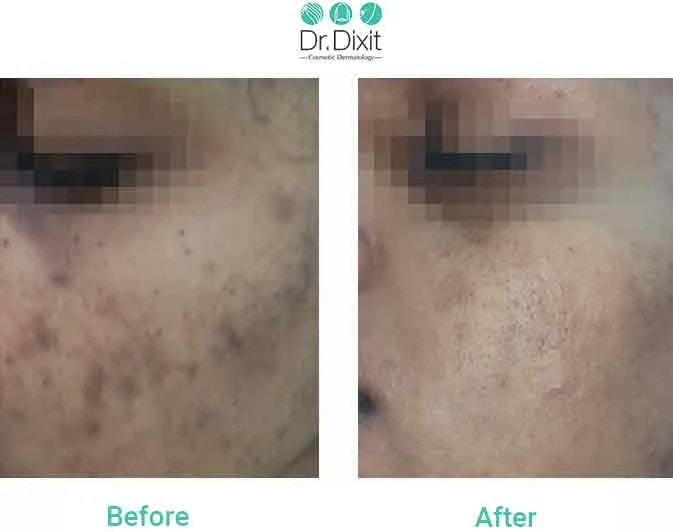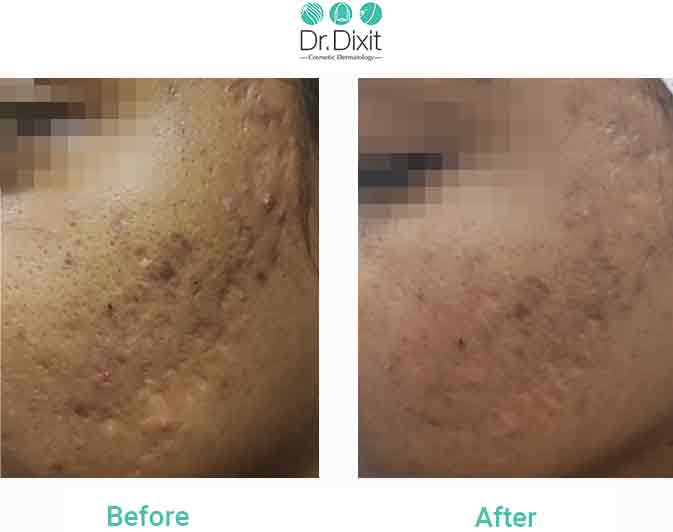- Home
- About Us
- Skin
Treatments - Skin Infections
- Dermato Surgical Procedure
- Facial slimming
- Skin Cancer
Treatments
Treatments
Acne is a common skin condition which affects most of the individuals during their lifetime. Acne is a condition of inflammation that is triggered by the oil glands of the face; however, it can be seen on the shoulders, back and, chest. The common terms used for acne are pimples or zits. The skin may have lesions like bumps, blackheads, whiteheads, cysts or boils as part of the acne. Often, a person with acne has one or more of these at the same time. Dermatologists usually grade the severity of acne by checking which type of lesions are most prominent.
Several factors contribute to the development of acne, including:
The first lesion of acne is a blackhead or a comedone. This is the block of the oil gland and is usually composed of skin cells and oil and not of dirt as commonly believed. If the block of the oil gland is deeper inside the skin, one can see whiteheads. Some people have red bumps with or without a head of pus known as papules and pustules. When these appear bigger in size they are known as cysts.
Often, people with acne also develop large open pores and scars. These scars may be on the surface of the skin (appear red or darker than the normal skin) or maybe elevated than the regular skin surface (hypertrophic scar) or depressed (atrophic scar). Scars symbolize long-term structural damage to the skin.


To know more about acne treatment in Bangalore, please feel free to contact us.
We like to assist our clients with a knowledgeable and in-depth collective approach to answer for all your queries and fears with our FAQ mega-base.
Acne is a chronic (long-lasting) disease associated with the oil-producing glands. Acne can be seen on the face, back or shoulders, and chest area. The initial step of acne formation is the development of a blackhead. This is because of the blockage at the exit of the oil gland. Once this happens, the oil or sebum accumulates in the tract. The bacteria which worsen acne known as Propionibacterium acne start to proliferate in the sebum. Then, the inflammation of the skin causes pus formation. Depending on the severity, either a red bump or a pus-filled pimple develops.
The formation of increased sebum and blackheads has definitely got a genetic predisposition. If individual parents had severe acne, then their offspring is likely to have severe acne too. Conditions such as increased junk food intake in the diet, including high sugars and dairy products (including protein supplements containing whey) also worsen acne. Obesity, lack of exercise, and physical activities also increase acne. In females, hormonal problems like delayed or irregular periods could signify Polycystic Ovarian Syndrome and could worsen acne.
The treatment of acne starts with the examination by a dermatologist, and then the dermatologist grades the acne according to the severity of the problem. The treatment measures may differ from patient to patient according to the type and severity of the acne. A patient with blackheads would not get the same treatment as one with mostly large, painful, and cystic acne.
The treatment discussed here is based on the International and Indian Consensus Group recommendations for dealing with acne. Most dermatologists follow these steps to deliver the best measures to achieve good improvement in acne. However, lifestyle and diet form a very important part of this treatment. So any acne treatment in Bangalore is incomplete without the patient’s compliance to the prescribed diet and exercise regime.
Treatment Step 1: Medical treatment with creams and face washes which contain alpha hydroxyl acids, topical antibiotics, topical benzoyl peroxide, and retinoid creams form the mainstay of all grades of acne. These products help regulate the oil secretion and remove blackheads, and dry out the pustules. These can be used in all grades of acne.
Treatment Step 2: The second step in acne management is the use of oral antibiotics. These are indicated when the acne has more red and inflamed lesions. These antibiotics are given up to 3 months, however, if the acne does not respond, then hormonal evaluation is done. The dermatologist then decides to treat with their gold standard of care for acne or with hormonal pills if the hormonal issues are associated.
Treatment Option 3: When the dermatologist chooses oral antibiotics or gold standard of care, often they recommend treatments such as chemical peels and comedone extraction. These treatments are beneficial in multiple ways.
Chemical peels exfoliate the upper layer of the skin thereby allowing the comedones to be removed without pain. This helps the skin to look better immediately and helps dry out acne. Also, the pigmentation associated with acne reduces. The need for higher doses of anti-acne medicines also reduces with peels. The common chemical peels used in most dermatology clinics are Glycolic peels and Salicylic peels. These can be performed for face, shoulders, back or chest, depending on the area of involvement. They can be safely performed as a lunchtime procedure in the clinic, and have little or no downtime. Chemical peels like TCA peel, Black peel, and Retinol peels are very helpful in reducing acne scars and pigmentation.
Photofacials are another excellent treatment when it comes to reducing acne. This either uses an IPL device or a Q-YAG laser device to reduce the oil secretion of the skin. These help to reduce the redness of the scars and acne and give almost instant results. These are the useful quick fix for that last minute party.
Dermatologists usually grade acne according to the severity as Grade 1, 2, 3, and 4.
Grade 1 acne is usually comedones, or blackheads and white heads.
Grade 2 acne has more red, or inflamed pimples, with few blackheads.
Grade 3 acne has more pus filled acne.
Grade 4 acne is the nodulocystic acne, where the acne is of very large sized nodules or cysts.
The importance of grading acne is that it allows the dermatologist to follow the appropriate international guidelines in order to treat the acne.
Remember when your mother told you not to eat too much chocolate as it would cause acne. She was right! There are a number of foods items that do cause acne, and now the research also proves it. Foods that you should avoid when you have acne are dairy products (including milk, cheese, butter, ghee, milkshakes, and ice creams), high sugar containing foods like desserts. Fried and spicy foods also make it to the list as they increase oil secretion. Junk food is a definite no-no!
Foods that help acne to get better include lots of fresh fruits, especially citrus fruits, and kiwis. And of course, you cannot go wrong with a salad.
Acne is a long term skin problem with many causes. During puberty, the hormonal changes cause the increase in the size of the oil glands, and as a result, most of the individuals may experience acne. However, this may settle down with age. This is called "Physiological Acne".
Nowadays, dermatologists are dealing with recurrent and long-standing acne in people even over the age of 30. This is called "Adult Acne". Adult acne is because of changing lifestyles and behaviors. Lack of exercise, weight gain, eating foods which are high in sugars or dairy products, smoking, hormonal problems such as Polycystic Ovaries Syndrome (PCOS) all these factors worsen acne. Also, excessive use of makeup or skin lightening creams which contain steroids also aggravate acne.
Acne which appears after the age of 25 is called adult acne. This may be persistent acne or acne which did not get better after teenage or acne which suddenly appears. In adult acne, the pimples appear mostly around the mouth or jawline and tend to be deeper, more painful and, they take up to a week or more to settle. Most of them do appear or become bigger just around the periods. The most important fact associated with adult acne is that it usually does not respond to creams and has a lifestyle or hormonal problem underlying it. So, adult acne is one of the reasons to surely consult your dermatologist.
Stress is a response of the body towards an emotional or a lifestyle situations. People suffer from work stress due to different work shifts, commute, and meeting deadlines. Also, due to the pace of life, there is increased stress. All these cause an increase in the release of the amount of adrenaline hormones, which behave to increase the sebaceous activity. Modification of lifestyle and stress do help in the reduction of acne and must be a part of the first line treatment of acne.
Exercise reduces the circulating hormones and helps the skin to detox. This means fewer acne and less need for continuous oral medication. However, some people do experience a transient and temporary increase in acne after exercise. This will resolve itself in a couple of months.
It’s also crucial to pay attention to your diet, and avoid intake of protein supplement which contains whey protein, as it may worsen acne. Also, drink plenty of water in a day and to hydrate your skin after exercising which will also help in reducing acne.
There are multiple causes of acne, including heredity, diet, environment, lack of exercise, stress, and, cosmetic use. So, it is wrong to assume that only medicines or chemical peels will help to cure the acne, without any contribution in the form of lifestyle changes. So, the patient has to partner with the dermatologist to get long term cure of acne.
In grade 1 acne, the problem is restricted to the upper layers of the skin with blackheads and whiteheads being the most important part of the acne symptom. So, following the International Acne Consensus recommendation, dermatologist prescribes to try creams and, face washes to decongest the oil glands as the first line of treatment. Again, in teenagers, or people who are trying for a pregnancy, it is recommended to avoid tablets. In such patients as well, dermatologists will prescribe only creams to treat acne.
In women, a common condition called Polycystic Ovaries causes resistant acne. So, if the acne does not respond to conventional treatment, or if the dermatologist observes skin changes of hormonal problems, like excessive facial hair or thinning of hair on the scalp, with or without a history of irregular or delayed periods, then an assessment of hormonal profile is called for. This usually includes both an ultrasound scan as well as a blood test for hormones. If any hormone problem is identified, then, the dermatologist in consultation with an endocrinologist will recommend a set of lifestyle and diet changes with medication.
Acne is a condition which takes time to resolve, however, it can affect the confidence of the affected person. Through lifestyle changes and medication, it is possible to achieve a good improvement of the acne. However, the time required to improve the condition is long. This is where chemical peels can give a good helping hand.
Chemical peels are quick and safe treatments where medicine is applied to the treatment area. This removes the upper and dead layers of the skin, helping to open the clogged pores and tackle the marks left by acne. They also help reduce the doses of oral medicines needed to treat acne. The skin looks fresh and clear, giving the patient the confidence boost needed.